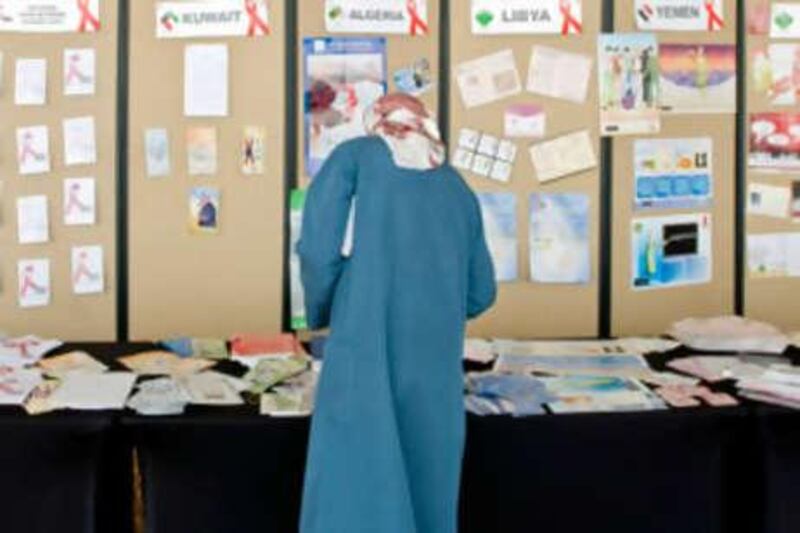Dubai // The UAE must strengthen its commitment to the fight against Aids if it is to stop the growing spread of the disease, officials said yesterday. Dubai hosted a Middle East and North Africa UNAids meeting yesterday, but many senior health authority officials failed to attend.
The Health Minister, Dr Hanif Hassen, was scheduled to attend the conference but was not present. Dr Mahmoud Fikri was the only senior representative from the Ministry of Health to formally participate in the event and delivered a welcome speech on behalf of Dr Hassen. The head of the National Aids Programme, Dr Nada al Marzouqi, was also absent. Other countries in the region, including Oman, Saudi Arabia, Qatar and Jordan, all sent a handful of delegates.
Nicole Massoud, who works with UNAids, the Joint United Nations programme on HIV/Aids in the Mena region, told delegates that countries needed to be better organised and focus their resources. "If you want to see a change, you need strong political commitment and comprehensive national programmes," Ms Massoud said. Although most countries have their own national Aids programme or council, they are "still not focussed enough" on the necessary interventions, she said, adding that if they are to be effective, they must be better organised.
"They are not properly costed," she said. "And they don't include the right technological capacities." Current levels of implementation are seriously inadequate, she added. Ms Massound presented figures showing the percentage of countries in the region in which "high-level officials speak out". Fewer than half of the presidents and heads of government had spoken on the subject, although "other officials in regions and/or districts" had done so in every country. But even then, she asked: "Is speaking out two times a year enough?"
Other problems included a lack of technical and financial resources, stigma and discrimination against sections of the population at particular risk of HIV, weak health and social systems, and weak surveillance. Dr Fikri declined to comment specifically on the Aids situation in the UAE, saying only that the ministry would make an announcement next week. In March the UAE released its UN Progress Report 2010 which, for the first time, made public figures on the number of HIV cases among the local population.
It showed that 636 UAE nationals had the disease. However many other vital statistics were missing. The report did not disclose how many people had been given the results of an HIV test in the previous 12 months, nor how many admitted having more than one sexual partner, which was deemed "irrelevant to the UAE's epidemiologic context". Laith Abu Raddad, who compiled a 282-page document on the HIV epidemic in the Mena region to present at the conference, said it was "ironic" that the richer countries tended to have much poorer data. This could hamper efforts to reduce the rate of transmission, said Mr Abu Raddad, who is based at the Weill Cornell Medical College in Qatar.
"The UAE should do a synthesis report on the transmission," he said. "They know they have around 600 cases, so now find out the mode of transmission." Without this, he said, the number of HIV cases was likely to increase among the most at-risk populations. According to a draft copy of the 2010 regional report on HIV to the UN, only 0.1 per cent of the UAE's total HIV budget is spent on prevention. None is targeted towards vulnerable populations.
Accepting that the region as a whole is often reluctant to acknowledge certain risk groups because of cultural and religious reasons, Dr Tim Martineau, the director for programme effectiveness and country support at the UN, said authorities needed to change their way of thinking. "The approach we are taking on it is to argue on a public health perspective rather than a legislative one," he said. "It is essential that we work on these population groups and not get embroiled in a moral debate about what's right or what's wrong.
"A decline in the number of new infections is noticeable globally, but there are two regions where this is not happening. There is a question about why that is occurring?" @Email:munderwood@thenational.ae





